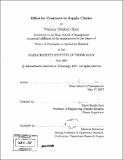Effective contracts in supply chains
Author(s)
Shum, Wanhang
DownloadFull printable version (6.275Mb)
Other Contributors
Massachusetts Institute of Technology. Operations Research Center.
Advisor
David Simchi-Levi.
Terms of use
Metadata
Show full item recordAbstract
In the past decade, we have seen significant increase in the level of outsourcing in many industries. This increase in the level of outsourcing increases the importance of implementing effective contracts in supply chains. In this thesis, we study several issues in supply chain contracts. In the first part of the thesis, we study the impact of effort in a supply chain with multiple retailers. The costly effort engaged by a retailer may increase or decrease the demands of other retailers. However, effort is usually not verifiable and hence not contractible. Based on the impact of a retailer's effort on its own and other retailers' revenue, we classify each retailer into different categories. According to the corresponding categories of all retailers, we identify coordinating contracts and general classes of contracts that cannot coordinate. Second, we study the stability of coordinating contracts in supply chains. We illustrate that, due to competition, not all coordinating contracts are achievable. Thus, we introduce the notion of rational contracts, which reflects the agents "bargaining power". We propose a general framework for coordinating and rational contracts. Using this framework, we analyze two supply chains, a supply chain with multiple suppliers and single retailer, and a supply chain with a single supplier and price-competing retailers. (cont.) We identify coordinating contracts for each case and characterize the bounds on profit shares for the agents in any rational contracts. Finally, we study the robustness of coordinating contracts to renegotiation. Applying the concept of contract equilibrium, we show that many coordinating contracts are not robust to bilateral renegotiation if the relationship between the supplier and the retailers is a one-shot game. If the supplier and retailers engage in long-term relationship, then many coordinating contracts are robust to bilateral renegotiation. We also extend concept of contract equilibrium to the concept of strong contract equilibrium to study the robustness of contracts to multilateral renegotiation. We show that, in repeated game setting, the concept of strong contract equilibrium is related to the concept of rational contracts.
Description
Thesis (Ph. D.)--Massachusetts Institute of Technology, Sloan School of Management, Operations Research Center, 2007. Includes bibliographical references (p. 115-121).
Date issued
2007Department
Massachusetts Institute of Technology. Operations Research Center; Sloan School of ManagementPublisher
Massachusetts Institute of Technology
Keywords
Operations Research Center.